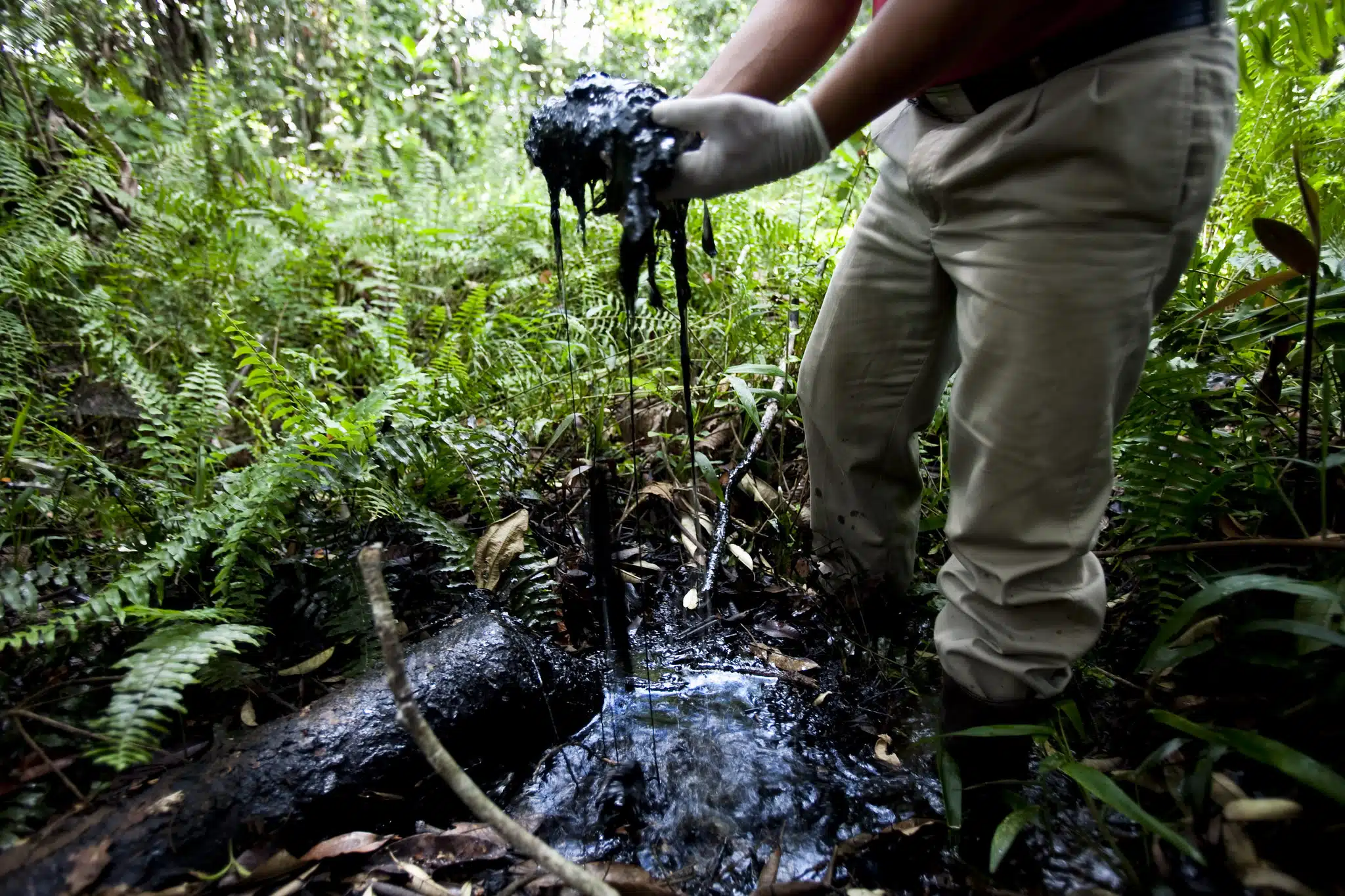
Changing Paradigms, Protecting Nature: Ecocide in International Law
As the global environmental crisis intensifies, new environmental law paradigms are gaining momentum, offering stronger tools to protect the natural world as well as ensure justice and accountability. Among these emerging approaches is the growing movement to recognize ecocide as an international crime, which has advanced alongside efforts to establish legal rights of nature. Both movements seek to enshrine in law values that many people hold dear, but are not yet widely reflected in legal systems.
In January 2022, the Center for Earth Ethics hosted a webinar examining ecocide as both a legal and ethical principle, and putting it in conversation with other emerging movements in ecocentric law. As support for the recognition of ecocide continues to build, we revisit that conversation to highlight foundational insights that remain central to shaping the evolving legal and moral framework for environmental protection.
The webinar, moderated by CEE Executive Director Karenna Gore, featured Kate Mackintosh, a specialist in international criminal law and a member of the 2021 Ecocide Panel; Olivia Swaak-Goldman, executive director of the Wildlife Justice Commission; Hugo Echeverria, an expert in the environmental rule of law and the rights of nature; and Michael Burger, executive director of the Sabin Center for Climate Change Law at Columbia University.
Background: The Movement to Recognize Ecocide
The movement to recognize ecocide as an international crime began in the early 1970s in response to the use of chemical defoliants in Vietnam. In 1990, Vietnam became the first country to adopt ecocide as a crime within its domestic statutes. In the 1990s, as the International Criminal Court (ICC) was being formed, ecocide was floated as a potential element of its statutes. The Rome Statute that became the basis of the ICC, ratified in 1998, lists four international crimes: genocide, crimes against humanity, war crimes and the crime of aggression. Although ecocide as such was not included at the time, environmental crimes in the context of war were included under the category of war crimes.
Calls to add ecocide to the Rome Statute have grown again in recent years, particularly through advocacy from the island nations of Vanuatu and the Maldives. Both are at extreme risk from sea level rise and have been at the forefront of international advocacy around climate justice solutions. In 2021, the NGO Stop Ecocide International convened a panel of international legal experts to draft a legal definition of ecocide for inclusion as a “fifth statute” in the Rome Statute. CEE’s 2022 webinar spotlighted the outcome of their work.

A New Tool
The experts defined ecocide as “unlawful or wanton acts committed with knowledge that there is a likelihood of severe and either widespread or long-term damage to the environment being caused by those acts.” Mackintosh, one of the experts who drafted the definition, explained that it parallels other definitions in the Rome Statute and is intended, in part, as a preventative measure. “It’s risky behavior that’s criminalized,” she said, to prevent greater harm.
Including ecocide would enable the powerful mechanism of international criminal law to intervene when an entity is initiating an action that could result in severe environmental destruction. Although the ICC only has jurisdiction over natural persons, establishing ecocide as a crime places the burden on states to intervene. “This takes the burden off of victims,” Mackintosh said. Much of environmental law falls under civil law, meaning that victims sue a nation state or corporation when they believe their rights have been affected. With climate change, Mackintosh noted that “we’re all affected—we’re all victims,” though those most impacted are often “the most marginalized, with the least resources.” Although many affected groups have teamed with NGOs to bring suits against states or corporations for violations of environmental and human rights, this process is significantly burdensome to victims. It can take years to reach resolution, if at all.
Mackintosh explained that including ecocide in the Rome Statute would elevate ecocide to the same level as genocide and crimes against humanity. While acknowledging that prosecutions may be rare, she argued that simply naming ecocide as a crime “can play a powerful role in shifting narratives” and could accelerate the systemic change needed.
Including ecocide in the Rome Statute would enable the powerful mechanism of international criminal law to intervene when an entity is initiating an action that could result in severe environmental destruction.
Allegra Lovejoy
Tackling Wildlife Trafficking
This law, if adopted, could offer new avenues for prosecuting wildlife crimes, said Swaak-Goldman. “Wildlife crime concerns the trafficking of endangered flora and fauna. It’s the fourth largest transnational organized crime, worth perhaps $23 billion a year.” Wildlife trafficking has serious consequences, she explained: direct impacts to biodiversity loss in vulnerable ecosystems, as well as impacts on money laundering and violence. “Wildlife crime endangers the stability of ecosystems and risks the loss of species. We are decimating our biodiversity, decimating key species, and there’s real risk of irreparable harm”—even extinction of many vulnerable species. Although prosecutors have often been limited to targeting local wildlife traffickers, Swaak-Goldman believes that an ecocide statute could enable prosecuting of larger-scale agents who drive the trade.
Rights of Nature Law in Ecuador
The rights of nature movement is a parallel initiative that seeks to endow natural places—sometimes a specific river or mountain, sometimes “nature” more broadly—with rights and protections equal to those of people. Advocates have often drawn on Indigenous values of holding natural places as equal to people, or as sacred sites. From a legal perspective, enshrining “rights of nature” in law enables the state to prevent or prosecute actions that would damage natural places, with a similar effect as ecocide law.
Echeverria, an Ecuadorian attorney and law professor spoke about the adoption of “rights of nature” into the Ecuadorian constitution and its impacts on environmental protection. Ecuadorian culture encourages respect for the country’s Indigenous Peoples as well as its rich biodiversity, Echeverria explained. Yet advocates were finding environmental protection laws to be inadequate, especially in protecting against the impacts of oil exploration. After a multiyear campaign, “rights of nature” was officially added to Ecuador’s constitution in 2008. This unlocked judicial power to act on environmental protection. A significant moment in what is sometimes referred to as “earth jurisprudence” took place in 2021, when the Constitutional Court of Ecuador ruled against mining activities in Los Cedros Forest in order to protect endangered species.

Granting legal rights to nature remains a subject of debate, even in Ecuador. As Echeverria explained, not all jurists support the concept; some argue that recognizing the rights of nature could undermine human rights and other societal needs. However, he countered that, in practice, rights of nature actually complement human rights, since humans are part of nature—“if we destroy nature, we are also destroying ourselves.” Echeverria emphasized that these principles push society to set more ambitious goals—to “aim higher”—and to fully realize the promise of sustainable development.
The timing matters too, Echeverria said. While the “right momentum” seemed to be in place in the early 2000s to achieve constitutional rights of nature in Ecuador, he believes that this is also the right moment for adding ecocide to the Rome Statutes. “Just as with any new idea, it’s not free from controversy and debate—but it makes sense when examined seriously.”
One such debate is on the extent or limits of culpability under an ecocide statute. For example, can individuals be prosecuted for the carbon emissions that come from everyday activities? Mackintosh said this is not the intent of the law. “We wouldn’t be looking at prosecuting everyday people, although we would hope for widespread behavioral change. We’d be looking at accountability for those most responsible—just as took place when apartheid in South Africa was being addressed,” she said.
Widespread Progress
A major development in the ecocide movement has been the emergence of powerful backers—a strategic imperative. “This is a treaty, so you need states to be pushing it and getting other states on board,” Swaak-Goldman said. Vanuatu, Fiji and Samoa—climate-vulnerable island states—have been consistent leaders in mobilizing other states and calling for the legal recognition of ecocide.
These countries’ advocacy has pushed wealthier countries towards action. In 2022, the European Parliament Report on Human Rights and Democracy recommended that member states support criminalizing ecocide at the ICC and in EU law. In 2023, the EU legal affairs committee unanimously voted to include ecocide. In 2024, Belgium became the first European country to add ecocide to its penal code, while several other countries, including Argentina, Sweden, the Dominican Republic and Scotland, have seen ecocide bills introduced.
If we destroy nature, we are also destroying ourselves.
Hugo Echeverria
Several African countries have moved toward criminalizing mass environmental destruction. The Democratic Republic of the Congo and Burundi have been especially strong supporters, catalyzing action across the continent. At the recent African Ministerial Conference on the Environment (AMCEN) in Nairobi, African environment ministers formally agreed to include ecocide among the continent’s environmental priorities—the first time a UN forum has explicitly recognized ecocide as a strategic priority.
A landmark advisory opinion issued by the International Court of Justice in July 2025 has given renewed momentum to the campaign. The court affirmed that states have legally binding responsibilities under international law to protect the climate system and the environment, prevent environmental harm, engage in cross-border cooperation and offer reparations when damage occurs. Visit our recent policy note on this topic to learn more.
For more information, watch the webinar or explore recent developments in this area at Stop Ecocide International or the Eco Jurisprudence Monitor.
